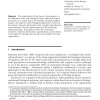ALIFE
2004
13 years 11 months ago
2004
We evolved multiple clones of populations of digital organisms to study the effects of chance, history, and adaptation in evolution. We show that clones adapted to a specific envir...
ALIFE
2004
13 years 11 months ago
2004
One of the central questions in evolutionary biology concerns the dynamics of adaptation and diversification. This issue can be addressed experimentally if replicate populations ad...
ALIFE
2004
13 years 11 months ago
2004
In the search for the primary roots of autonomy (a pivotal concept in Varela's comprehensive understanding of living beings), the theory of autopoiesis provided an explicit cr...
ALIFE
2004
13 years 11 months ago
2004
We study the evolution of robustness in digital organisms adapting to a high mutation rate. As genomes adjust to the harsh mutational environment, the mean effect of single mutatio...
ALIFE
2004
13 years 11 months ago
2004
Turn-taking behavior is simulated in a coupled-agents system. Each agent is modeled as a mobile robot with two wheels. A recurrent neural network is used to produce the motor outpu...
ALIFE
2004
13 years 11 months ago
2004
The contribution of the theory of autopoiesis to the definition of life and biological theory affirms biological autonomy as a central notion of scientific and philosophical inquir...
ALIFE
2004
13 years 11 months ago
2004
The concept of "self-protection", a capability of an organism to protect itself from exogenous attacks, is introduced to the design of artificial evolutionary systems as...
ALIFE
2004
13 years 11 months ago
2004
The Avida digital evolution platform is a software tool used to perform experimental evolution research with self-replicating computer programs ("digital organisms"). Av...
ALIFE
2004
13 years 11 months ago
2004
Phylogenetic trees group organisms by their ancestral relationships. There are a number of distinct algorithms used to reconstruct these trees from molecular sequence data, but dif...
ALIFE
2004
13 years 11 months ago
2004
This paper proposes a method of visualizing and measuring evolution in Artificial Life simulations. The evolving population of agents is treated as a dynamical system. The propose...

